SUMMARY
This is AI generated summarization, which may have errors. For context, always refer to the full article.
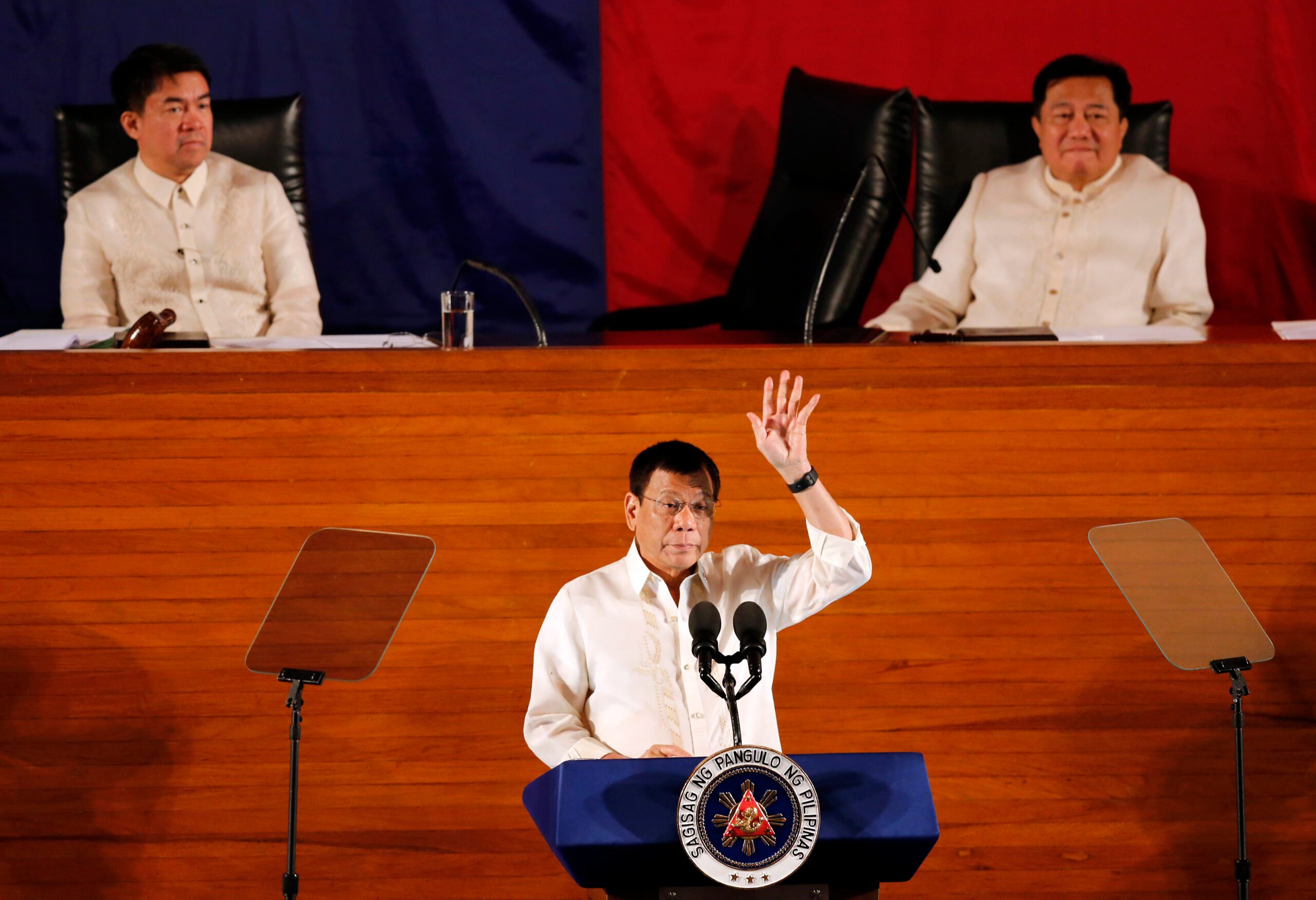
MANILA, Philippines – During his first State of the Nation Address (SONA), President Rodrigo Duterte ordered 24 senators and 292 congressmen and congresswomen to pass measures on federalism, tax reform, freedom of information, and to grant him emergency powers to address Metro Manila traffic, among others. (FULL TEXT: President Duterte’s 1st State of the Nation Address)
Duterte, however, did not mention two bills that his top allies in the 17th Congress – Senate President Aquilino Pimentel III and House Speaker Pantaleon Alvarez – declared they would prioritize during their terms.
These are the reimposition of the death penalty for heinous crimes through lethal injection, and the lowering the minimum age of criminal responsibility from 15 to 9 years old. (READ: Congressmen want 9-year-old kids charged for crimes)
Prior to Duterte’s SONA, at least two senators have opposed the passage of the two bills, fearing a possible situation in the future when a 9-year-old is sentenced to life imprisonment, or even death. (READ: Alvarez to Pangilinan, Aquino: Bill seeks to rehabilitate child offenders)
Still, the President directly addressed Congress several times during his SONA for them to pass his legislative agenda. (READ: What bills have been refiled in the 17th Congress?)
Here are some of Duterte’s pet bills:
“You know my advice to you is maintain a federal system, a parliament, but be sure to have a president. Huwag…hindi na ako niyan. [applause] I’m disqualified and by that time I would longer be here. But, I can commit today to the Republic of the Philippines and its people: If you hurry up the federal system of government and you can submit it to the Filipino people by the 4th, 5th year – proseso ‘yan eh – you call for a referendum and after that call for a presidential election, I will go. Sibat na ako. But you just have a president. You copy the France system.”
The switch to federalism was among the top campaign promises of Duterte and continues to be a centerpiece of his administration.
He said federalism would distribute wealth and power across the country, removing the concentration on “imperial” Manila.
Under a federal system, the country will be divided into autonomous states that will have jurisdiction over their own laws, industries, public safety, education, healthcare, infrastructure, transportation, and culture. (READ: Will federalism address PH woes? Pros and cons of making the shift)
The national government is left to oversee matters with nationwide bearing like foreign policy and national security.
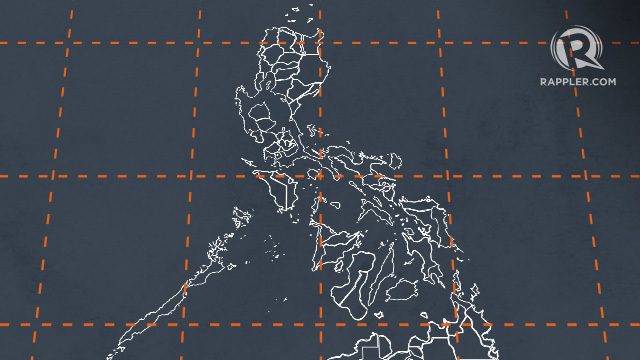
To make this possible, the 1987 Constitution has to be amended. There are 3 modes to do so: through a Constitutional Convention (Con-Con), a body separate from Congress and elected through popular vote or appointed by the President; a Constituent Assembly, composed of sitting legislators; and a People’s Initiative.
On Wednesday, Duterte told House Speaker Pantaleon Alvarez, Senate President Aquilino Pimentel III, and Budget Secretary Benjamin Diokno that he wants a Constituent Assembly and also wants to have the amendments ratified by 2019.
Duterte previously preferred a Con-Con, but he later changed his mind because a Constituent Assembly is faster and cheaper. (READ: How many states should PH have under federalism?)
He advised the Philippines to have a federal parliamentary government that would still have a president elected by the people.
“On taxation, my administration will pursue tax reforms towards a simpler, and more equitable, and more efficient tax system that can foster investment and job creation. We will lower personal and corporate income tax rates [applause] and relax the bank secrecy laws. [applause] Eh na-Presidente ako eh. Ayaw ko sana makialam dito sa mga ‘to. Alam mo na. Well, anyway. May I continue.”
The country still has the second highest tax income rate in Southeast Asia and the highest corporate tax rate among its peers in the 6 biggest economies in the region. (READ: Why PH has 2nd highest income tax in ASEAN)
When Duterte announced that he would move to lower personal income and corporate taxes during the SONA, the plenary hall was filled with applause.
“At the household level, there must be sufficient income for all Filipinos to meet the basic food and non-food needs for their families and we will continue to attract investments that will generate thousands of jobs a year, jobs that are suitable for the poor and less skilled members of the workforce,” he said.
This was widely received because Duterte’s predecessor, former President Benigno Aquino III, said he was “not convinced” to that lowering income tax was necessary. (READ: Dominguez bares tax reform plans to businessmen)
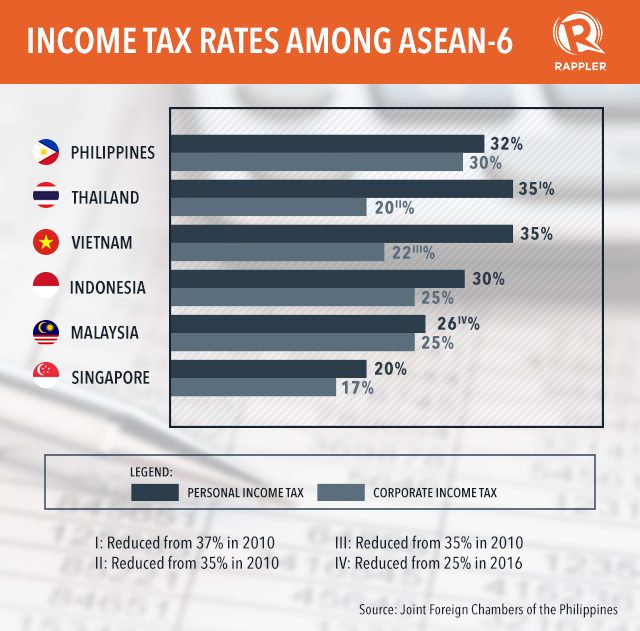
In his SONA, Duterte also promised to relax the bank secrecy law.
In the fallout of the $100-million Bangladesh Bank heist, Anti-Money Laundering Act author and ex-Senator Sergio Osmeña III identified the need to add more teeth to the law. (READ: Hard lessons learned as Senate ends bank heist probe)
“We have the strictest bank secrecy law in the whole world. Congress doesn’t want to loosen it up. Why? You and I have our own guesses. It’s very easy for criminals to hide their money in the Philippines. As a matter of fact, we are one of the most active money laundering centers in the world,” said Osmeña.
“Many in government opine realistically, and I would have to agree, that the worsening traffic situation could be logically addressed, if Congress would also accord emergency powers to the agencies concerned. [applause]”
The traffic in Metro Manila has worsened over the years, with bumper-to-bumper cars, hot-headed drivers, and time wasted on congested roads slowly becoming the norm.
Transportation Secretary Arthur Tugade said Duterte’s request to be given emergency powers to address traffic will allow the government to open private subdivisions to traffic, among others.
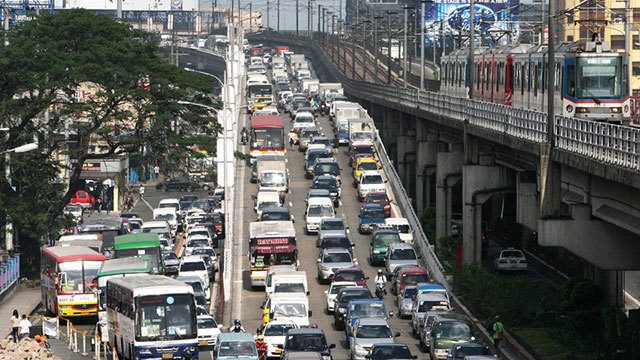
And the President is likely to get the legislative branch’s nod. Senate President Pro-Tempore Franklin Drilon and Senator JV Ejercito have filed versions of the measure.
At the Lower House, the following have filed bills to give emergency powers to Duterte: Alvarez, Majority Floor Leader Rudy Fariñas, Minority Floor Leader Danilo Suarez, Camarines Sur 1st District Representative Rolando Andaya, Rizal 1st District Representative Jack Duavit, Tarlac 1st District Representative Carlos Cojuanco, Masbate 2nd District Repersentative Olga Kho, Batangas 2nd District Representative Raneo Abu, Cebu 4th District Representative Benhur Salimbangon, AKO Bicol Representative Rodel Batocabe, and Davao City 1st District Representative Karlos Nograles.
Drilon, Senate Minority Floor Leader Ralph Recto, and Senator Leila de Lima, however, also urged Congress to strengthen defenses against possible abuses on the measures that will grant Duterte emergency powers. The 3 are from the former ruling Liberal Party.
“For the driver’s licenses, its effectiveness will be extended from the current 3-year period to 5 years. [applause]…. On the clamor of our citizens for timely issuance of Philippine passports, the government shall work towards amendment of the 1996 Passport Law to lengthen the validity of the passports from the current 5 years to 10 years. [applause] Tutal kayo naman ang maggagawa ng batas. You are the ones who will pass the law, even if you make it good for 30 years, okay ako. Bahala kayo. [laughter] Basta, stretch a little bit because five years is just really simply on a regular basis.”
In his SONA, Duterte recounted that he saw a long line of passport applicants outside a mall in Davao City, where the Department of Foreign Affairs (DFA) has a satellite office.
The President, who was former Davao City mayor, said that many of these applicants stayed overnight and slept on the pavement because the mall is the only place where the DFA holds a satellite office in the city.
“Nasasaktan talaga ako. Masakit ito,” said Duterte. (I’m really hurt. This is really painful.)
Foreign Secretary Perfecto Yasay Jr previously said the President ordered him to speed up the application process for Filipinos.
Duterte then addressed his Cabinet members: “Make use of the computer. I do not want to see people lining up under the heat of the sun. I do not want people lining up under the rain.”
Yasay earlier said Duterte has ordered him to speed up processes for Filipinos.
Recto has already filed bills seeking to extend the validity of passports to 10 years and driver’s licenses to 5 years.
“Eh ang maganda nito, I have signed the Executive Order sa aming FOI. Naunahan ko kayo. Iyong inyo… Nandoon na ang sa akin [applause]. Oo, tapos na ako. Ilabas ko na – it will be out today. Alam mo sabi ko, unahan na natin itong Congress, puro mayayabang ang mga nandiyan. We grab the – each other…. They say, “stealing one’s thunder,” ika nga. Unahan na natin.”
There is more pressure on Congress to finally pass the FOI bill into law after Duterte signed an executive order (EO) mandating full public disclosure of all officers under the executive branch.
The previous 16th Congress failed to pass the FOI bill, causing a huge disappointment among civic groups and watchdogs who had long been clamoring for its passage. (READ: Why the Philippines needs a freedom of information law)
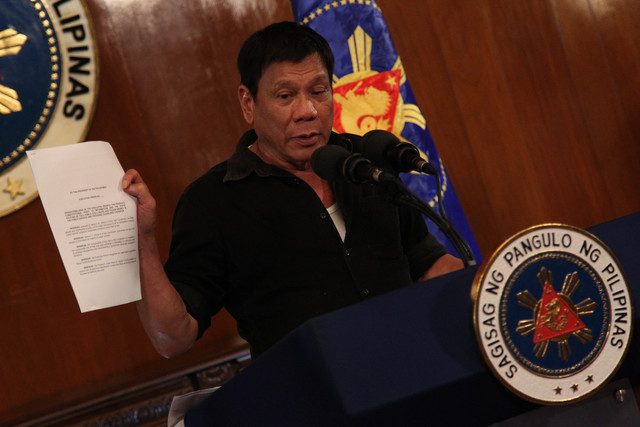
Legislators have since refiled versions of the FOI bill under the 17th Congress.
They are senators Edgardo Angara and Grace Poe, Ifugao Representative Teddy Brawner Baguilar Jr, Quezon City 6th District Representative Jose Christopher Belmonte, Cebu 1st District Representative Raul del Mar, Kabayan Representative Harry Roque, and Quezon City 5th District Representative Alfred Vargas.
“To better manage public information, a law should be passed – I’m addressing Congress – to create the People’s Broadcasting Corporation, replacing PTV-4, [applause] the government-run TV station, which now aims to replicate international government broadcasting networks.”
In his SONA, Duterte appealed to lawmakers to help create the new government-run People’s Broadcasting Corporation (PBC) that will be at par with international channels like the British Broadcasting Corporation (BBC).
PBC is set to replace PTV-4, the current television station of the Philippine government.
The administration has taken the first steps to make this a reality. Michelle Rowland of the BBC World Service went to Malacañang to meet with Communications Secretary Martin Andanar.
According to Duterte, foreign news executives from BBC and ABC would train PTV4 personnel “to observe editorial independence through innovative programs, intelligent treatment, and analysis of news reports as well as developments of national and international significance.”
The state-run Radyo ng Bayan will also be integrated into the PBC.
Duterte also said in his speech that he wants create the country’s first Muslim and Lumad channels.
“As we are presently setting up a Presidential Communications Satellite Office in Davao City, PBC will also put up broadcast hubs in the Visayas and Mindanao. [applause] Davao City will also be the first site of the first Muslim channel, to be called Salaam Television, [applause] and the first Lumad channel,” Duterte said.
“To eradicate the prevalent cultures of fear and silence that have hounded our justice system, I asked Congress – you – to enact the Whistleblower Protection Law while the present Witness Protection Program shall be strengthened. [applause] [Hirap maging Presidente. Maski dito lang.] [laughter]”
The President urged Congress to finally pass the whistleblower protection act. Earlier versions of the bill were filed in the 15th Congress and 16th Congress, but they were not prioritized.
In the 17th Congress, Kabayan Representative Harry Roque was happy that Duterte is supporting his House Bill Number 223 or the “Whistleblowers’ Protection Act.”
Under the bill, a whistleblower is defined as a person who reveals a misconduct, commission, or an attempted commission of a crime by a person, employer, employee, or an agency in either the public or private sector.
The whistleblowers, their spouses, and relatives within the first civil degree by consanguinity or affinity would be given a safe house, livelihood source, financial assistance, medical care, and a security detail.
These are similar to the benefits given to those who will apply under the Department of Justice’s Witness Protection Program, which Duterte also wants to strengthen.
“Ang sinasabi kong babalik ako, dahil ako sa federalism. Both Misuari, Sema and all, at least the politiko leaders ng Mindanao will agree to it. We do not…. Remember that ako ‘yung…. Hindi ko dinidikdik ‘yung masyadong Abu Sayyaf because it is really connected with the first talks between Misuari, the President, subsequently President Marcos and now, until now, until now. The only way they said that we can have this. Iyong BBL, ibigay na natin, minus the things that you do not want. [applause] Iyong mga Constitutional issues. Tanggalin muna natin. Ibigay ko yung area. Nandiyan na yan eh. So I ask you pass it minus the Constitutional issues that are contentious. [applause] Ibigay na natin at when the federal system comes, isali mo na sa package, together with Misuari. That is the solution for Mindanao. Nothing else. Believe me. Nothing else will do. Please sleep on it, ponder on it, because that’s the only way to proceed.”
In the SONA, Duterte asked the 17th Congress to pass the Bangsamoro Basic Law (BBL), but to do so only after removing its highly contested provisions.
The BBL is based on the Comprehensive Agreement on the Bangsamoro (CAB), signed in 2014 following 17 years of negotiations between the government and the Moro Islamic Liberation Front. (READ: The Bangsamoro peace deal at a glance)
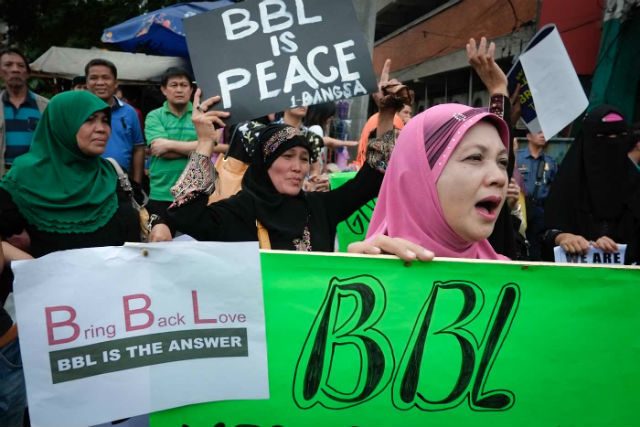
The 16th Congress failed to pass after the bloody police operation in Mamasapano town, Maguindanao, where at least 60 people perished in January 2015.
Presidential Peace Adviser Jesus Dureza said the Duterte administration will honor previous agreements set with the Moro rebels.
Legislative work on the new version of the BBL, however, will be held simultaneously with the efforts to shift to federalism.
“I may now also ask on Congress to consider drawing up bills consolidating and merging agencies and offices having to do the Overseas Filipino to have a department that shall focus on and quickly respond to their problems and concerns. Kailangan ko ng isa. [applause]”
In yet another bid to end red tape, Duterte asked Congress to lift a burden off the shoulders of overseas Filipino workers (OFWs) and a create a separate department for them.
The President said he wants OFWs to find under one roof all the offices they need in order to process all their necessary documents.

ACTS-OFW Representative John Bertiz already filed HB Number 192 to comply with this, aiming to ”ensure a unified, fast, and coherent approach in extending government services to Filipinos overseas and their families.”
The lawmaker said than aspiring OFW has to go through at least 7 agencies from the time he or she files his application to his or her day of departure.
The new OFW Department would streamline the application processes for OFWs and also strengthen their reintegration program back into Philippine society when they decide to return to the country for food.
Under the bill, some government agencies, offices and bureaus shall be collapsed and be integrated to the DMD. But Philippine Overseas Employment Administration and the Overseas Workers Welfare Administration remain as attached agencies. – Rappler.com
Add a comment
How does this make you feel?
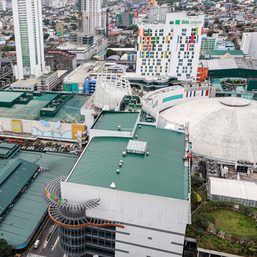




There are no comments yet. Add your comment to start the conversation.